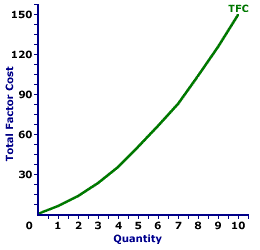
|
|
LIQUIDITY: The ease of converting an asset into money (either checking accounts or currency) in a timely fashion with little or no loss in value. Money is the standard for liquidity because it is, well, money and no conversion is needed. Other assets, both financial and physical have varying degrees of liquidity. Savings accounts, certificates of deposit, and money market accounts are highly liquid. Stocks, bonds, and are another step down in liquidity. While they can be "cashed in," price fluctuations, brokerage fees, and assorted transactions expenses tend to reduce their money value. Physical assets, like houses, cars, furniture, clothing, food, and the like have substantially less liquidity.
Visit the GLOSS*arama
|
|


|

|
                           TOTAL FACTOR COST CURVE, MONOPSONY: A curve that graphically represents the relation between total factor cost incurred by a monopsony when using a given factor of production to produce a good or service. The total factor cost curve is most important in factor market analysis for the derivation of the marginal factor cost curve. Monopsony is a market structure with a single buyer or in terms of factor markets, a single employer. This means that monopsony is a price maker, with control over the buying side of the market. Market control means monopsony faces a positively-sloped supply curve. To buy a larger quantity, it must pay a higher price.The total factor cost curve reflects the degree of market control held by a firm. For a perfectly competitive firm with no market control hiring inputs under perfect competition, the total factor cost curve is a straight line that emerges from the origin. For firms with market control, including monopsony, oligopsony, or monopsonistic competition, the total factor cost curve increases at an increasing rate. The shape of the total factor cost curve thus indicates the degree of market control possessed by the factor buyer. Total Factor Cost Curve,
Monopsony |  |
The exhibit to the right displays the total factor cost curve for a hypothetical firm, OmniKing Island Resort. This firm is the only employer of labor on a small tropical island. As the only employer of labor on the island, OmniKing is a monopsony with extensive market control, and it faces a positively-sloped supply curve. To employ more workers, OmniKing must pay a higher price.The vertical axis measures total factor cost and the horizontal axis measures the quantity of input (workers). Although quantity on this particular graph stops at 10 workers, it could go higher. This curve indicates that if OmniKing hires 1 worker (at $6 per worker), then it pays $6 of total factor cost. Alternatively, if it hires 10 workers (at $15 per worker), then it pays $150 of total factor cost. For OmniKing the total factor cost "curve" really is a "curve." The slope of this curve rises as more labor is hired. The changing slope of this curve is due to the changing price. Although this total factor cost curve is based on the employment activity of OmniKing Island Resort, a well-known monopsony firm, it applies to any buyer with market control. Monopsonistic competition and oligopsony firms that also face positively-sloped supply curves generate comparable total factor cost curves.

Recommended Citation:TOTAL FACTOR COST CURVE, MONOPSONY, AmosWEB Encyclonomic WEB*pedia, http://www.AmosWEB.com, AmosWEB LLC, 2000-2025. [Accessed: July 18, 2025].
Check Out These Related Terms... | | | | | | | | | | | | |
Or For A Little Background... | | | | | | | | | | | |
And For Further Study... | | | | | | | | |
Search Again?
Back to the WEB*pedia
|



|

|
BEIGE MUNDORTLE
[What's This?]
Today, you are likely to spend a great deal of time strolling around a discount warehouse buying club hoping to buy either a case for your designer sunglasses or arch supports for your shoes. Be on the lookout for crowded shopping malls.
Your Complete Scope
This isn't me! What am I?
|

|
|
Junk bonds are so called because they have a better than 50% chance of default, carrying a Standard & Poor's rating of CC or lower.
|

|
|
"A winner is someone who recognizes his God-given talents, works his tail off to develop them into skills, and uses those skills to accomplish his goals. " -- Larry Bird, basketball player
|

|
RONA
Return on Net Assets
|

|
|
Tell us what you think about AmosWEB. Like what you see? Have suggestions for improvements? Let us know. Click the User Feedback link.
User Feedback
|


|


